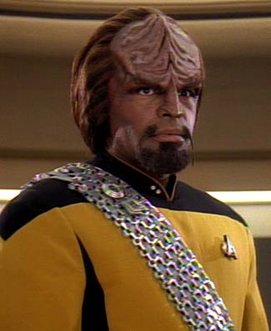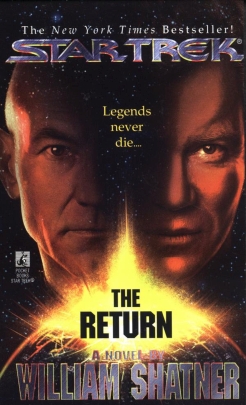
Star Trek: The Next Generation (TNG) is an American science fiction television series created by Gene Roddenberry. It originally aired from September 28, 1987, to May 23, 1994, in syndication, spanning 178 episodes over seven seasons. The third series in the Star Trek franchise, it was inspired by Star Trek: The Original Series. Set in the latter third of the 24th century, when Earth is part of the United Federation of Planets, it follows the adventures of a Starfleet starship, the USS Enterprise (NCC-1701-D), in its exploration of the Alpha quadrant in the Milky Way galaxy.

Worf, son of Mogh is a fictional character in the Star Trek franchise, portrayed by actor Michael Dorn. He appears in the television series Star Trek: The Next Generation (TNG), seasons four through seven of Star Trek: Deep Space Nine (DS9) and the third and final season of Star Trek: Picard, as well as the feature films Star Trek Generations (1994), Star Trek: First Contact (1996), Star Trek: Insurrection (1998), and Star Trek: Nemesis (2002).

The Romulans are an extraterrestrial race in the American science fiction franchise Star Trek. They first appeared in the series Star Trek (1966–1969). They have appeared in most subsequent Star Trek releases, including The Animated Series, The Next Generation, Deep Space Nine, Voyager, Enterprise, Discovery, Picard, Strange New Worlds, and Lower Decks. They appear in the Star Trek feature films Star Trek V: The Final Frontier (1989), Star Trek VI: The Undiscovered Country (1991), Star Trek: Nemesis (2002) and Star Trek (2009). They also appear in various other spin-off media, including books, comics, toys and games.
Enterprise or USS Enterprise is the name of several fictional spacecraft, some of which are the main craft and setting for various television series and films in the Star Trek science fiction franchise. The most notable were Captain James T. Kirk's USS Enterprise (NCC-1701) from the original 1960s television series, and Captain Jean-Luc Picard's USS Enterprise (NCC-1701-D) from Star Trek: The Next Generation.

Captain Christopher "Chris" Pike is a fictional character in the Star Trek science fiction franchise. He is the immediate predecessor to James T. Kirk as captain of the starship USS Enterprise.
"Mirror, Mirror" is the fourth episode of the second season of the American science fiction television series Star Trek. Written by Jerome Bixby and directed by Marc Daniels, it was first broadcast on October 6, 1967.
"The Enemy" is the seventh episode of the third season of the syndicated American science fiction television series Star Trek: The Next Generation, the 55th episode overall, first broadcast on November 6, 1989.
The Mirror Universe is the setting of several narratives in the Star Trek science fiction franchise, a parallel universe existing alongside, but separate from, the fictional universe that is the main setting of Star Trek. It resembles the main Star Trek universe, but is populated by more violent and opportunistic doubles of its people. The Mirror Universe has been visited in one episode of Star Trek: The Original Series, five episodes of Star Trek: Deep Space Nine, a two-part episode of Star Trek: Enterprise, a storyline woven through the first season of Star Trek: Discovery, and several non-canon Star Trek tie-in works. It is named after "Mirror, Mirror", the Original Series episode in which it first appeared.
"Parallels" is the 11th episode of the seventh season of the American science fiction television series Star Trek: The Next Generation, the 163rd overall. It was originally released on November 29, 1993, in broadcast syndication. The episode was written by Brannon Braga, and directed by Robert Wiemer. Executive producer Jeri Taylor wrote its final scene, but was uncredited.

The USS Enterprise NCC-1701-E is a fictional starship belonging to the United Federation of Planets, commonly known as the Federation, in the Star Trek franchise. It appears in the films Star Trek: First Contact, Star Trek: Insurrection and Star Trek: Nemesis, where it serves as the primary setting. It is the sixth Federation starship to carry the name Enterprise. The ship's captain during the 2370s and early 2380s was Jean-Luc Picard. He was transferred to the Enterprise-E after the Enterprise-D was destroyed in The Next Generation spin-off movie Star Trek Generations.
"Where No One Has Gone Before" is the fifth episode of the American science-fiction television series Star Trek: The Next Generation, which originally aired October 26, 1987, in broadcast syndication in the United States. A high-definition, remastered version of the episode received a limited theatrical release for one day to celebrate the 25th anniversary of the series on July 23, 2012. The story was originally developed with the title "Where None Have Gone Before" and was based on Diane Duane's book, The Wounded Sky. Duane and Michael Reaves pitched the idea to David Gerrold and Gene Roddenberry, and then submitted a script. Their script was subsequently rewritten by Maurice Hurley, whose first effort was poorly received; however, he subsequently rewrote it and that version was filmed. The episode was the first of the series directed by Rob Bowman, who went on to direct 12 more episodes. It was the only Star Trek: The Next Generation assignment for writers Duane and Reaves.

Q-Squared is a non-canon Star Trek novel by Peter David. It spent five weeks on the New York Times bestseller list in 1994.

The Return is a novel by William Shatner that was co-written with Garfield Reeves-Stevens and Judith Reeves-Stevens. It is set in the Star Trek universe but, as part of the "Shatnerverse," does not follow the timeline established by other Star Trek novels. The book's sequel is Avenger.

Jean-Luc Picard is a fictional character in the Star Trek franchise, most often seen as the captain of the Federation starship USS Enterprise (NCC-1701-D). Played by Patrick Stewart, Picard has appeared in the television series Star Trek: The Next Generation (TNG) and the premiere episode of Star Trek: Deep Space Nine, as well as the feature films Star Trek Generations (1994), Star Trek: First Contact (1996), Star Trek: Insurrection (1998), and Star Trek: Nemesis (2002). He is also featured as the central character in the show Star Trek: Picard (2020–2023).
Several characters within the Star Trek franchise, primary and secondary, often made crossover appearances between one series and another. This included appearances of established characters on premiere episodes of new series, a few long-term transfers from one series to another, and even crossovers between Trek films and television. A few crossover appearances, such as that of Spock on The Next Generation and the time-travel of the crew of Deep Space Nine to the era of The Original Series were especially lauded by both fans and critics.

The fifth season of the American science fiction television series Star Trek: The Next Generation commenced airing in broadcast syndication in the United States on September 23, 1991, and concluded on June 15, 1992, after airing 26 episodes. Set in the 24th century, the series follows the adventures of the crew of the Starfleet starship Enterprise-D. This season is notable among Star Trek fans as the season when Gene Roddenberry died of cardiac arrest on October 24, 1991. Production on the episode "Hero Worship", directed by Patrick Stewart, was halted when news reached the set.

The seventh and final season of the American science fiction television series Star Trek: The Next Generation commenced airing in broadcast syndication in the United States on September 20, 1993, and concluded on May 23, 1994, after airing 26 episodes. Set in the 24th century, the series follows the adventures of the crew of the Starfleet starship Enterprise-D.
The following outline is provided as an overview of and topical guide to Star Trek:

The Star Trek franchise, begun in 1966, has frequently included stories inspired by and alluding to the works of William Shakespeare. The science fiction franchise includes television series, films, comic books, novels and games, and has material both Star Trek canon and non-canon. Many of the actors involved have been part of Shakespearean productions, including Patrick Stewart and Christopher Plummer.











